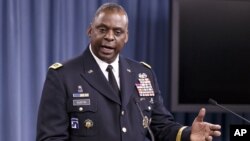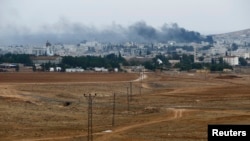The top commander of U.S. forces in the Middle East says the campaign against Islamic State militants in Iraq and Syria is "having the desired effects" toward degrading the group's capabilities, but will take time.
General Lloyd Austin told reporters Friday at the Pentagon the U.S. military's main focus is enabling the efforts of Iraqi forces in their fight against the Islamic State group. However, most coalition strikes are hitting targets around Kobani, Syria, a town Kurdish forces have desperately fought to keep out of Islamic State hands.
The head of U.S. Central Command forces waging war against Islamic State said coalition air strikes around Kobani are “not a diversion” from U.S. goals. He said they were a way for the coalition to "take advantage of an opportunity" to take out the "legions" of Islamic State forces pouring into the area.
“My goal is to defeat and ultimately destroy ISIL [Islamic State]," Austin said. The more we wear down Islamic State in Kobani, the less we will have to fight them on some other part of the battlefield, he said.
Despite "encouraging" progress, he said it is still "highly possible" the Syrian city will fall. He said he believes the Islamic State group has decided to make seizing Kobani its main effort.
The White House says President Barack Obama met with his national security team Friday on the battle for Kobani and the overall fight against Islamic State. General Austin was among those at the meeting.
The White House says topics also included what it calls the need to "fully integrate the unique capabilities of key coalition partners."
The Syrian Observatory for Human Rights says more than 660 people have been killed since the IS offensive on Kobani began. The rights group noted the overall death toll could be twice that estimate because of what it called "extreme secrecy" about casualties from both sides.
U.S. Central Command says U.S. fighter aircraft conducted six airstrikes Thursday and Friday near Kobani that successfully struck Islamic State targets, including buildings and vehicles.
Friday's U.S. Central Command statement said another U.S. airstrike hit Islamic State oil collection equipment near the Syrian city of Shadadi, while partner nations hit militant targets in Iraq.
In an interview with VOA Kurdish Service, Iraqi Army Chief of Staff Babakir Zebari said he believes Iraqi forces can "do the job" of defeating IS fighters "if they have strong air support and training."
Elsewhere in Syria, the Britain-based Syrian Observatory for Human Rights says Iraqi pilots are training Islamic State fighters to fly three fighter jets they captured.
The rights group says the pilots are former Iraqi army officers who served under Saddam Hussein. Witnesses have reported seeing the planes flying over the captured al-Jarrah military airport east of the city of Aleppo.
Gen. Austin told reporters he has no operational reports of Islamic State militants flying jets in support of their forces on the ground.
U.S. acknowledges talks
U.S. airstrikes against the Islamic State increased in Kobani this week as the United States acknowledged it held the first direct talks with a Syrian Kurdish political party linked to Kurdish guerrillas that U.S. and Turkey call terrorists.
State Department spokeswoman Jen Psaki said a top U.S. official met with the Kurdish Democratic Union Party in Paris on Saturday, but the meeting does not represent coordination against the Islamic State.
The party is tied to the PKK, Kurdish separatists who have carried out numerous attacks inside Turkey while fighting for an independent Kurdistan in Turkey, Iran, Iraq and Syria. Psaki said the U.S. is fully aware of the connection between the Kurds in Syria and the PKK, which Washington still regards as a terrorist group.
But Polat Can, spokesman for the Kurdish People’s Protection Units (YPG), told VOA's Kurdish service earlier this week that the Kurdish militia had a "direct relationship" with the U.S. coalition and is providing coordinates for airstrikes in Kobani, known also as Ayn al-Arab.
A senior Defense Department official also confirmed to VOA "there has been some level of coordination with Kurdish forces in Syria" but declined to elaborate.
The U.S. Defense Department said airstrikes have killed "several hundred" Islamic State fighters in Kobani.
View from refugee camp
VOA correspondent Scott Bobb, visiting a new camp for Kurdish refugees on Turkey's side of the border, said the people are living in tarpaulin tents. There are fears of "children falling sick" as winter approaches, he said. Winds and the high altitude already contribute to chilly temperatures.
The refugees have received allocations of blankets and clothing, though, along with three meals a day, they told Bobb.
"People acknowledge they’re receiving a great deal of assistance" from the Turkish government, independent donors and political parties, particularly the Kurdish party, said Bobb.
VOA's Kurdish service and correspondent Scott Bobb contributed to this report.





